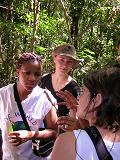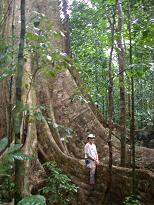Teaching
Philosophy —
|
|
Teaching
Philosophy —
|
|
| Teaching
Experience — Ecological & Geophysical Sciences |
|
|
(current courses in Bold) Winter Ecology - Field course - University of Colorado, Boulder
Conservation Biology
& Practice in Brazil's Atlantic Forest - Education Abroad
field course - University
of Colorado, Boulder
The Earth's Climate System - Semester at Sea
|
Park Associations, EarthWatch, & Secondary Education Programs
On-line Information for current students of
|
Faculty Director and Instructor. Conservation Biology and Practice in Brazil's Atlantic Forest program, Education Abroad (formerly Study Abroad), Univ of Colorado at Boulder. Sept 2010-present.
- Conservation Biology and Practice in Brazil's Atlantic Forest Global Seminar (EBIO/ENVS 4340/5340; 4 semester credits). Undergraduate and graduate field course demonstrating successful conservation practices in human-impacted tropical forest landscapes. May/May-June 2011-2019, 2021 (held virtually), 2024; forthcoming Summer 2025.
- Syllabus (pdf)
- Informational video:
https://www.youtube.com/watch?v=YE87fAIcz4Y
- Course listed by the Forum on Education Abroad's Curriculum Cooperative (pdf of listing, 300k)
Il faut aller voir –
We must go and see
– Jacques-Yves Cousteau
Brazil GS course in the Cambury Quilombo
- a subsistence community embedded in an Atlantic Forest conservation area
(photo: (c)2011 T.Kittel)
Lecturer, University of Colorado, Mountain Research Station, Nederland, CO. 2005-present. Winter Ecology (EBIO 4100-570), a field course on wintertime abiotic factors and biotic adaptations. A 3-credit course in Upper Montane and Subalpine Forests to Timberline (9,000-11,000ft) in Colorado's Rocky Mountains Front Range. Dept of Ecology and Evolutionary Biology, Advanced Ecology course series, University of Colorado, Boulder, CO. Jan-Feb/Feb-Mar 2005-06, 2008-2019, 2023-2025.
Field Methods in Vegetation Ecology (EBIO 4100-573), a field course on concepts and field methods in vegetation science -- surveying physical and biological processes that control the distribution and dynamics of vegetation. A 3-week, 3-credit course exploring the ecology of Colorado's Front Range – from Great Plains grasslands to the Continental Divide, with an emphasis on dynamics of upper montane, subalpine, and alpine landscapes (9,000-11,000ft). Dept of Ecology and Evolutionary Biology, Advanced Ecology course series, University of Colorado, Boulder, CO. July 2013-2015, 2018, July-Aug 2019, July 2022, June-July 2024; forthcoming June-July 2025.
- Syllabus (pdf, 200k)

Winter Limnology
(photo: (c)S. Spaulding)
Lead Instructor, Earth Institute Center for Environmental Sustainability (formerly, Center for Environmental Research and Conservation). Columbia University, NY. Summers 2000-2005, 2007-2012, 2014, 2018. Summer Ecosystem Experiences for Undergraduates (SEE-U) – Two simultaneous, integrated field courses: Conservation Biology (ENVB W2102) & Intro to Field Methods in Ecology (ENVB W2103) (6 semester credits total). An intensive 5-week field course designed to give students an understanding of ecological principles and conservation biology and experience in implementing the scientific method. Instruction is tailored to the needs of both non-science and science majors. Students participate in both group and individual field research activities.
- Sites (19 sessions, 4 sites)
- Arizona – July-Aug 2000, June-July 2001.
- Dominican Republic – May-July 2005, Jun-Aug 2012.
- Puerto Rico – July-Aug 2010.
- Brazil – 14 sessions 2002-2005, 2007-2011, 2014, 2018. Syllabus
- July-Aug 2002, June-July & July-Aug 2003, June-July 2004, July-Aug 2005
- June-July 2007, May-July & July-Aug 2008 & 2009; May-June 2010 & 2011
- May-July 2014, June-July 2018.
- Informational video:
https://www.youtube.com/watch?v=PCec9A3Wf7k
- Part of the curriculum for the Sustainable Development Undergraduate Program, Earth Institute, Columbia University
- Course Companion Guides: On-line information for students of the course in
- Brazil's Atlantic Forest (Archived from Summer 2011)
- The Dominican Republic's Caribbean Coastal Reef & Terrestrial Ecosystems (Archived from Summer 2005)
- Implemented in following environments:
- Sonoran Desert/Arizona Savana at Biosphere 2 Center, Oracle, AZ – 2000-2001.
- Brazil's endangered Atlantic Forest (Mata Atlântica) at Instituto de Pesquisas Ecológicas (IPÊ), Nazaré Paulista, São Paulo, Brazil – 2002-2005, 2007-2011, 2014, 2018.
- Dominican Republic's Caribbean Coastal Reef & Terrestrial Ecosystems at the Puna Cana Biodiversity Laboratory. 2005, 2012.
- Puerto Rico's Montane Tropical Rain Forest, El Verde Field Station, Luquillo Mountains. 2010.

SEE-U in the Atlantic Forest
Lecturer, Semester at Sea, Institute for Shipboard Education, Charlottesville, VA. Fall 2006 voyage. (Visiting Lecturer, University of Virginia, Charlottesville. Aug-Dec 2006). (Environmental Sciences: SEMS 161, 163, 361)
- World Ecosystems (syllabus - pdf, 145k)
- The Earth's Climate System (syllabus- pdf, 145k)
- The Ecology and Conservation of Biodiversity Hotspots (syllabus - pdf, 160k)
- Voyage Itinerary
- Outline of in-country field trips w/ photos
“Twenty years from now you will be more disappointed by the things that you didn't do
than by the ones you did do. So throw off the bowlines. Sail away from the safe harbor.
Catch the trade winds in your sails. Explore. Dream. Discover.”
- Mark Twain

Cat Tien National Park, Vietnam (photo: (c)G. Kittel)
Instructor, Program for Ecological Studies, Colorado State University, Ft. Collins. Aug-Dec 1989.
- Global Change Graduate Seminar
Guest Lecturer
International Affairs Program, University of Colorado at Boulder. Sept 2013.
Development, Conservation, and Social Movements in Latin America (IAFS 3000). Lecture: “Linking Biodiversity Conservation & Socioeconomic Development – Examples from Brazil”Semester at Sea, Institute for Shipboard Education, Charlottesville, VA. Fall 2006 voyage.Global Studies. Lecture: “Climate: Our Changing Stage”Department of Environmental, Population, and Organismic Biology, University of Colorado, Boulder. April 2000.
Community College. Lecture “Typhoons - Asia's Perfect Storm”Global Ecology. Lecture: “Future Vegetation Change: Response of Ecosystem Structure and Distribution to Altered Forcing”Department of Zoology and Physiology, University of Wyoming. March 1994.GIS Applications in Ecological Modeling. Lecture: “Development of Integrated Datasets for Regional Ecosystem Modeling”Department of Range Science, Colorado State University, Ft. Collins. May 1989.Biogeochemistry. Lecture: “Atmosphere-Ecosystem Interactions”
Division of Environmental Studies, University of California, Davis:Principles of Environmental Science. Jan 1984. Lecture: “Systems Modeling”Department of Biological Sciences, California State University, Sacramento. March 1980.
Field and Laboratory Methods in Ecology. Oct 1983. Lecture: “Methods in Plant Ecology”
Limnology Laboratory. April 1980, 1981, 1983, and 1984. Lecture: “Heat Budgets of Lakes”General Ecology. Lecture: “Methods in Plant Ecology”Teaching Assistant
Division of Environmental Studies, University of California, Davis. 1978-1983.Dept. of Land, Air, & Water Resources, University of California, Davis. 1978-1983.Principles of Environmental Science General Ecology Global Ecology Atmospheric Thermodynamics Weather Analysis and Forecasting
Adult Learner Field Programs –
Instructor, Rocky Mountain Conservancy's Conservation Corps, Estes Park, CO.
- Climate Change in the Rockies, Rocky Mountain National Park – One-day field course. July 2017
Instructor, Rocky Mountain Conservancy Field Institute (formerly Rocky Mountain Nature Association), Estes Park, CO.
- Climate Change in the Rockies, Rocky Mountain National Park – One-day field course, accredited through Colorado School of Mines. Aug 2013, 2014, Sept 2015.
Volunteer Scientist, EarthWatch Expeditions. Dec 1977-Jan 1978.
- Spring Ecology, Rocky Mountain National Park – Two-day field course, accredited through Colorado State Univ. Apr 2007, 2008, & 2011.
Associate Scientist, Educational Expeditions International (EarthWatch). April 1973.
- Guanacos of Patagonia Research Expedition, Chile – Instruction (Plant Ecology) and field logistics.
- Guanaco Behavioral Ecology Expedition, Peru – Instruction (Plant Ecology) and field logistics.
Spring Ecology 2007, Rocky Mountain National Park
Investigating Holly Grape (Mahonia repens) in blossom.
(photo - T Kittel)
Secondary Education Field Programs –
Assistant Field Director, Foresta Institute for Ocean and Mountain Studies, Carson City, NV. July-Aug 1972.
Mountaineering Program Leader, Foresta Institute for Ocean and Mountain Studies, Carson City, NV. July-Aug 1970, 1971, Jun-July 1975.
- Washoe Pines Ecology Program. – Instruction and logistics: Experiential environmental education for junior high school students.
Field Ecology Instructor, Foresta Institute for Ocean and Mountain Studies, Carson City, NV:
- Washoe Pines Ecology Program. – Instruction: Backpacking skills, experiential environmental education for junior high school students.
Visiting Lecturer, Foresta Institute for Ocean and Mountain Studies, Carson City, NV.NSF-High School Student Science Training Program (SSTP). June-July 1971, 1972. – Instruction: Plant ecology and microclimatology. NSF-Teachers' In-Service Institute (TISI). Oct-Dec 1971. – Environmental education training for high school teachers. IUCN-UNESCO Joint International Environmental Education Conference. June-July 1970. – Course concurrent with conference demonstrating high school-level residential environmental education curriculum. Instructor, Agora Alternative Education Program, Davis Senior High School. Apr-June 1975.
- NSF-High School Student Science Training Program (SSTP). June-July 1974
The Study of Natural Areas – Developed and taught: classroom and field ecology class for academically at-risk students.
Senior Thesis Committee, Environment Studies Program. 2011-2012.
Postdoctoral Fellow mentoring, Advanced Study Program, National Center for Atmospheric Research – D. Yates. 1997-1998.Postdoctoral Fellow Research Planning Committee, Advanced Study Program, National Center for Atmospheric Research – R.F. Cannon. 1997-1998.
Ph.D. Qualifying Examination Committee, Department of Geological Sciences, University of Colorado, Boulder. 1994.
Hidden Corners, Inc., Mongolian Magic Expedition. Presentation: “Ecology of Lake Khövsgöl.” July 1998.National Park Service, Natural Resources Management Trainee Program, Denver, CO. Presentation: “Global Change: Causes and Impacts.” March 1991.
EarthWatch Expeditions, Ecology of Great Plains Grasslands Project, Pawnee National Grassland, CO. Presentation: “Climate of Arid Lands: Global Distribution and Causes.” July 1990.
Adult CPR/AED & Infant CPR. American Heart Association. 2016 (2-year certification).
First Aid. American Heart Association. 2017 (2-year certification).
Wilderness First Aid. American Red Cross. 2005.
Avalanche Rescue, Level I.
Larimer County (Colorado) Search and Rescue Team. 1996-1997.
HOME PAGE
|
CV
|
INTERNATIONAL FIELD EXPERIENCE